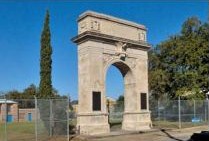On November 11, 2018, we celebrate the one hundredth anniversary of Armistice Day or the end of World War One, opens a new window (after World War Two, the holiday would come to be known as Veteran's Day). The war began in the summer of 1914 after the assassination of Austrian Archduke Franz Ferdinand.
Initially Americans, including Louisianans, remained officially neutral. In New Orleans organizations held benefits for both the French and the Germans. In April 1915, the German Society, opens a new window held a two-night bazaar to raise money for the German Red Cross. The event included a beer garden, live German music, and a bake sale, and it raised about $7,000 (the equivalent of about $165,650 today). Mayor Martin Behrman, opens a new window contributed $6.25 (the equivalent of nearly $150 today) to that fundraising effort, according to a letter he wrote on city stationery that is on file at the Historic New Orleans Collection, opens a new window.
Less than three years later, in April 1917, the United States declared war on Germany. New Orleans rapidly joined the war efforts. The military established Camp Nicholls in City Park and Camp Martin at the Fair Grounds, which later moved to Tulane University. More than 4.8 million American men and women, 74,103 from Louisiana, would serve in the Great War. Nearly 1.4 million US personnel fought on the front lines, and 122,500 lost their lives.
Almost immediately after the war ended in 1918, the people of the 9th Ward began collecting money for a Memorial Arch. In some cases volunteers went door to door to raise the $6,990 to build what was said to be the first permanent World War One memorial in the country. The arch was dedicated in March 1920, and included the names of the 1,260 men and one woman from the 9th Ward who were killed in action, served in the armed forces, or contributed to the war effort. The memorial currently stands in the 3800 block of Burgundy Street.
The Center for Southeast Louisiana Studies at Southeastern Louisiana University in Hammond is currently hosting an exhibit entitled "The War That Did Not End All Wars: Louisiana and the Horror of World War 1.", opens a new window The exhibit is free and open to the public and will remain on display through December 10.
To learn more about World War One or New Orleans during the war, check out one of the sites below:
Tulane Louisiana Research Collection: Louisiana and World War One, opens a new window
Historic New Orleans Collection: At Home and at War: New Orleans, 1914–1919, opens a new window
British Library: World War One, opens a new window
National Archives: World War One Centennial, opens a new window





Add a comment to: Celebrating the Tricentennial: New Orleans and the Great War